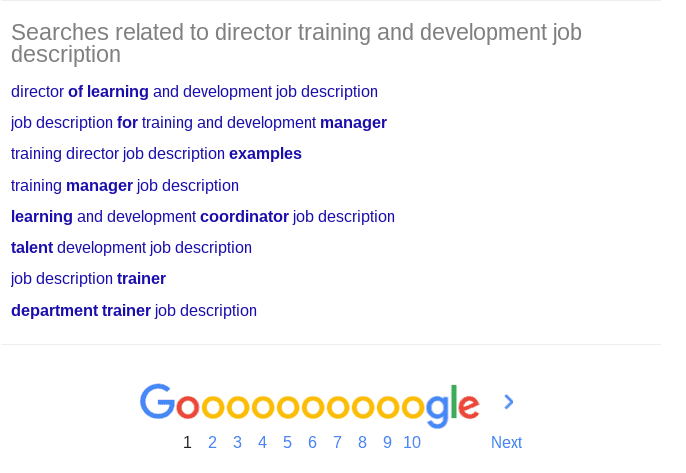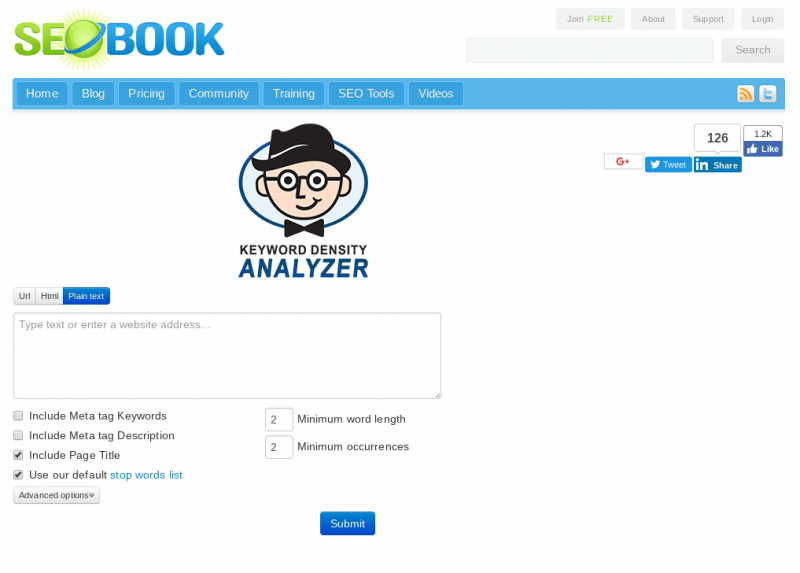Resume keywords are vital to staying ahead of your job competition. Here is our ultimate guide to finding power verbs and keywords to stay competitive.
Resume keywords and power verbs are a part of the algorithm of the initial recruiting automation. Every company and every position are different so don’t get obsessed with trying to figure out the algorithm. Set yourself up for success by incorporating industry and targeted role keywords and phrase trends.
The Goal of Resume Keywords Research
The purpose of your resume keywords and power verbs research is to develop a list of relevant industry, position, and operative words. These power verbs will increase the chances of successfully being saved in both an automated ‘resume bot’ screening and an overworked hiring manager who is quickly scanning hundreds of resumes.
Additionally, once you get to the point of customizing and targeting your resume for specific positions, you’ll also further refine this list for those ‘dream jobs.’
For now, we will focus on how to conduct keyword research and develop your keyword list for your baseline resume.
A. Determine Industry & Position Targets
Narrow the sector and possible jobs that you will be targeting. The primary resume keywords will be different based on these two factors. At most, stick to 2-3 sectors and positions target combinations and be sure to make them as precise as possible.
For example, ‘consulting’ as an industry is entirely too broad to use in your resume keywords strategy.
Management consulting, IT consulting, career consulting would be more specific industry categories to include in your keyword research.
The same applies to position targets. ‘Analyst’ is too broad of a position target for the IT consulting industry. More accurate position goals would be a business analyst, technical analyst or data analyst.
B. Determine Seniority Position Targets
Align your target position should to seniority. The job requirements and descriptions will have critical resume keywords differences based on seniority.
For example, you can further specify a seniority level for the position of ‘analyst’ such as senior analyst or lead analyst.
Step 1 – Industry and Position Resume Keywords Target Analysis
Based on the target criteria you developed earlier, search for job descriptions of particular positions.
Begin with leaving geographical and industry-specific criteria out initially so you can build a broader sample of words and phrases.
For example, let’s assume I’ve narrowed down the following with my search criteria:
A. Industry Focus
Training and Development in the Finance industry
B. Position Focus
Leader of training and development teams/departments
C. Seniority Focus
Director
My initial search is going to leave out the Finance industry search criteria.
If you are narrowly focused on only one industry, then you should include that in your resume keywords research initially. There will be industry-specific requirements and terms that will be vital to leverage.
If it is simply a target, then leave it out at first.
Based on the above, my initial resume keywords search is going to be for “Director training and development job descriptions.”
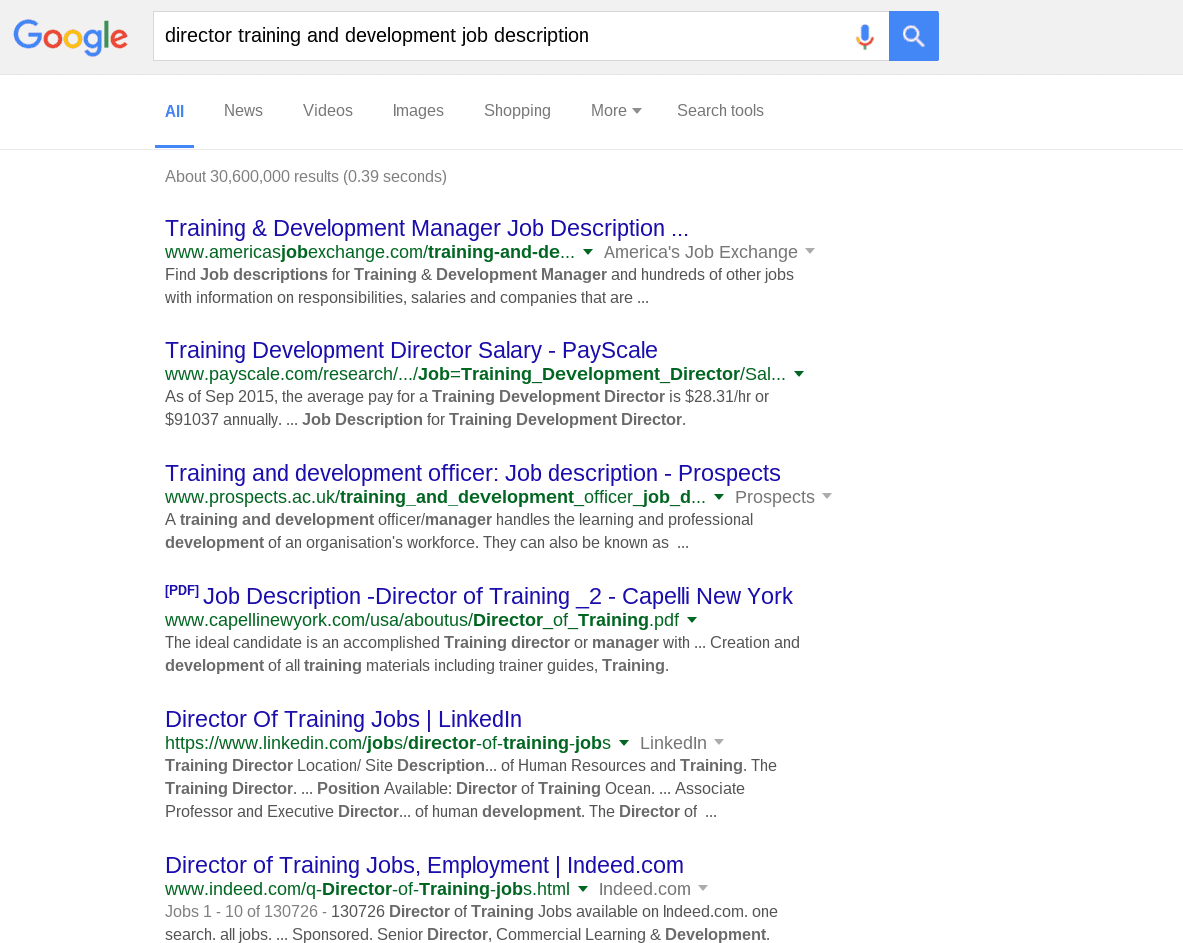
There is magic here that you don’t see yet!
Before you go all crazy-brilliant and start clicking through all the links in results, there is some resume keywords magic that you do not see yet. I’ll show you how to find it.
Place your cursor in the search bar and you’ll see a list that automatically displays.

What is this and why is it so important?
These are variations on the search you just performed, and you are going to want to capture these for additional searches throughout your resume, interview, and general career strategies.
I can already see that a standard industry equivalent title to Director is Manager. I am going to do some searches for Manager as well.
Capture the Information:
1. Open a word processing document (I use Google Docs and Drive, and they are free with your Gmail account).
2. Title the document with the job title.
3. Go to the print option in the resume keywords and power verbs search results window. Select print to PDF. It should render the PDF before you have to print or save it.
4. In the print preview, highlight the terms that appeared in the search results.
5. Copy the highlighted words.
6. Paste the search terms in the doc to save so you have the additional resume keywords, phrases and power verbs for future use.
Alternative method: Save to Google Drive Browser Extension
If you use Chrome, a simple option is to use the Save to Google Drive browser extension. This tool is an incredible productivity booster. I use it dozens of times a day.
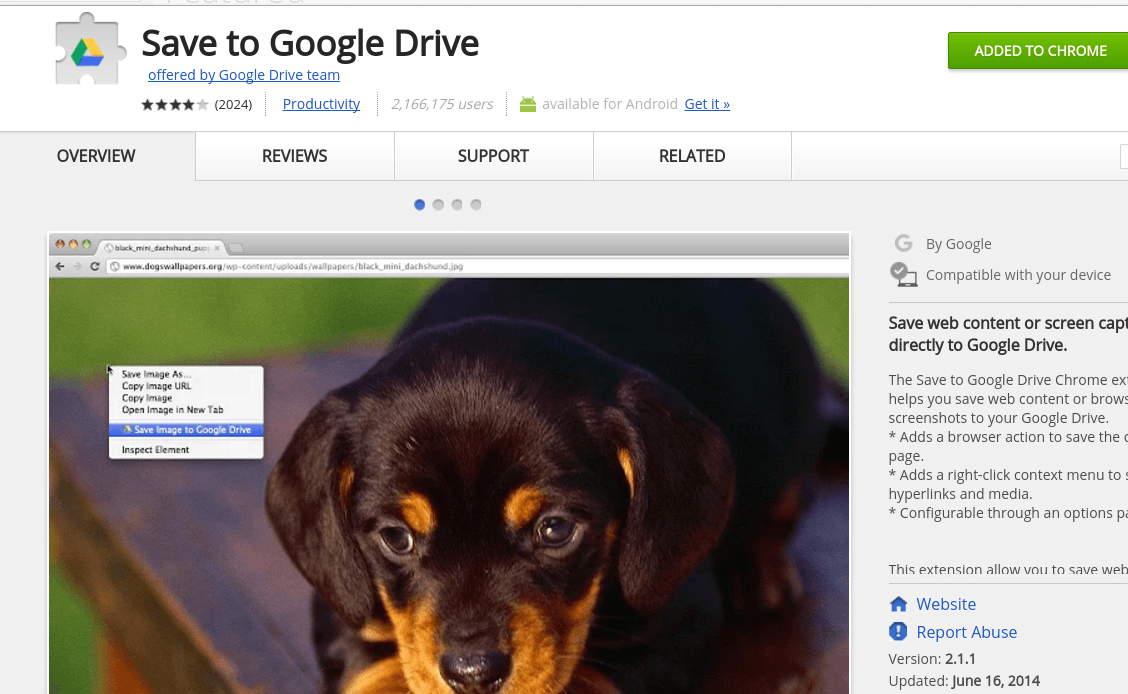
And look at how cute that damn puppy is. I simply cannot with that little nugget!
Once you install the extension, right click on the icon, and hit on ‘options’. Choose to save as a Google Doc.

Back in the search results page, just hit the icon in the browser and then magic happens.
Still More Magic Resume Keywords Treasure in the Search Results
On the same search results page, scroll all the way to the bottom.
You’ll see something similar to this:
You now have even more search terms and phrases for both your resume and job search strategy!
Be sure to copy and paste these into the document you started earlier.
These resume keywords are particularly useful to your job position searches.
Step 2 – Finding Content for Resume Keywords and Power Verbs Analysis
A. Find 10 or More Relevant Job Descriptions
I would start your way from the top and work your way down. Ideally, they should be currently or recently active job descriptions. Be sure to read them.
Why?
Select the ones you would have an interest in applying for, and this will ensure your keywords and resume are strategically targeted.
Although they will likely fall in your search results, some other excellent sites to find relevant job descriptions would include:
B. Job Description and Resume Power Verbs Research Resources
These sites are great resources to finding job description and resume content.
Apply to 145,433 Linkedin jobs on LinkedIn. Sign-up today, leverage your professional network and get hired. New Linkedin jobs added daily.
You can use this tool to find careers that match your top interests while filtering out jobs in areas that you have little or no interest.
Find millions of jobs from thousands of company websites, job boards, and newspapers. One search. All jobs.
Search jobs online and apply current job openings in your city or state unique to a profession or other niche area.
Get advice or search over 1.6 million jobs on the largest job site, set alerts to be first in line and have new jobs emailed to you.
Your source for jobs and career opportunities. Search for jobs, read career advice from employment experts, and find hiring and recruiting advice.
Step 3: Copy & Paste Content to Build Your Power Verbs Data
In the (at least) 10 of the best samples, copy and paste the core content of the job descriptions. Try and exclude anything outside of the job requirements or specifications.
For example, don’t copy and past the standard headers in the document.
I would also suggest pulling some of the resumes from the search variations that you discovered earlier.
Past them all into a single document. Don’t worry about formatting as you are only after the content.
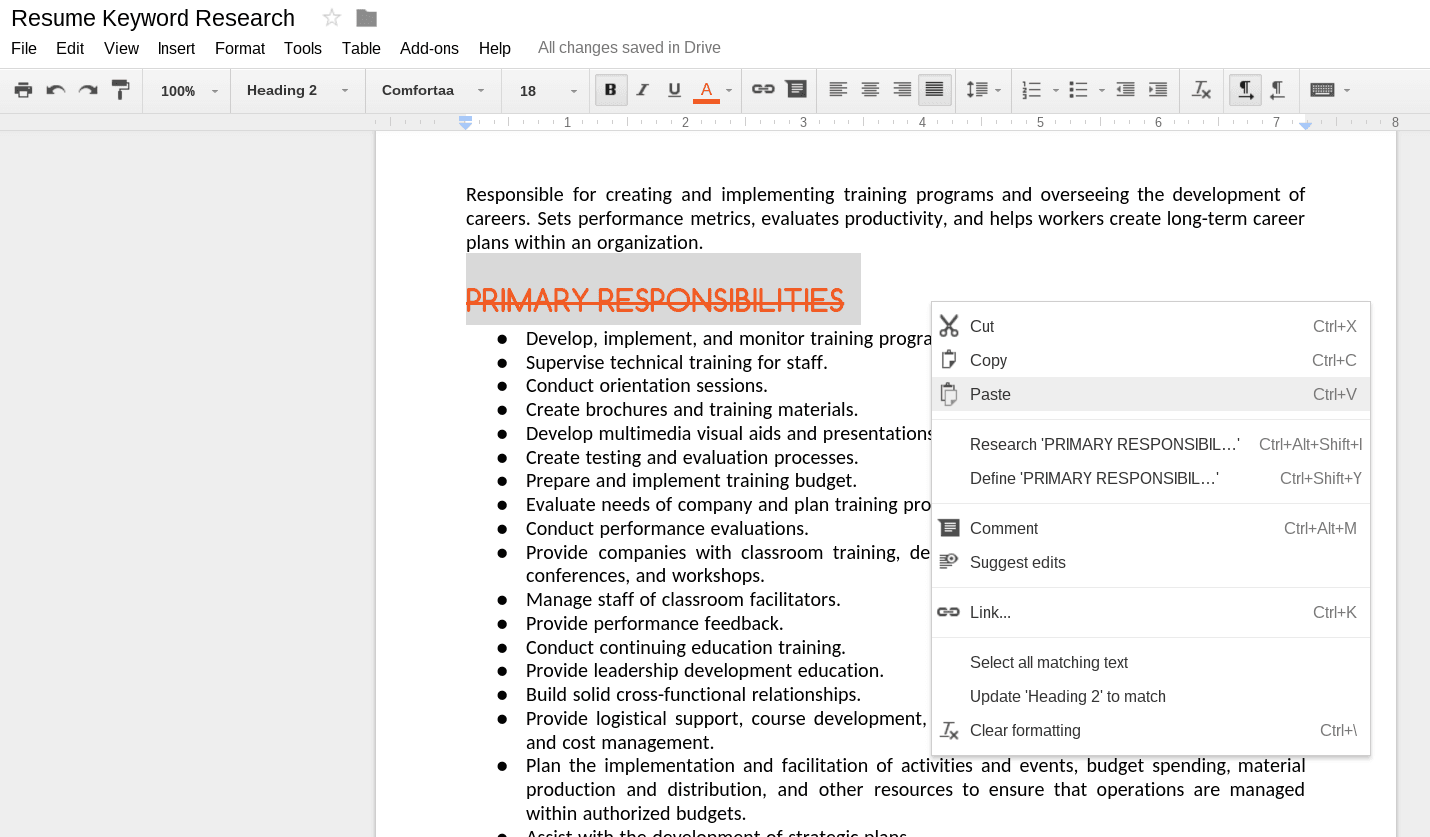
Step 4: Use Keywords Analysis Tool for Ranking
There are two, free analyzer tools that I recommend using with each having a different purpose.
A. Resume Keywords Search Tool
1. In the document containing all the content from the job descriptions, do a quick ‘select all’ and then ‘copy.’
2. Go to Word Counter and paste everything into the open box. Do not submit for analysis yet.
Again don’t be concerned with formatting. As long as the content is in there, it can be analyzed.
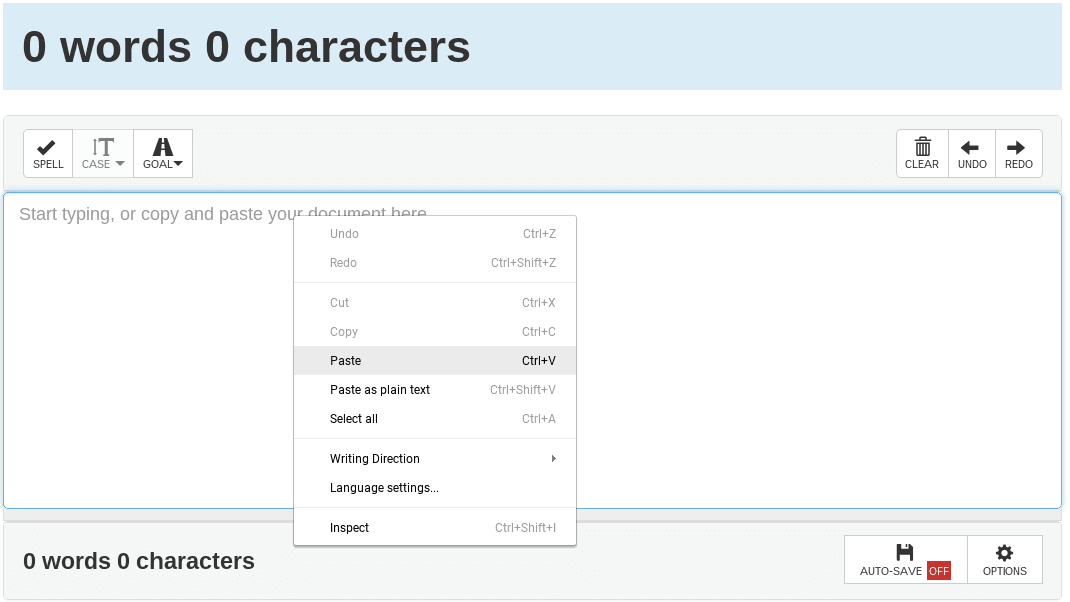
3. Go to the “Options” menu at the bottom right of the box. Select the tab “Keyword Density.”
4. Check the option for “Turn on Keyword Density panel.”
5. In the box just below put 50 in the “Show keywords in the Keyword Density” box.
6. Uncheck “Include common words in word density count.”
7. Click “Done” and the magic happens!
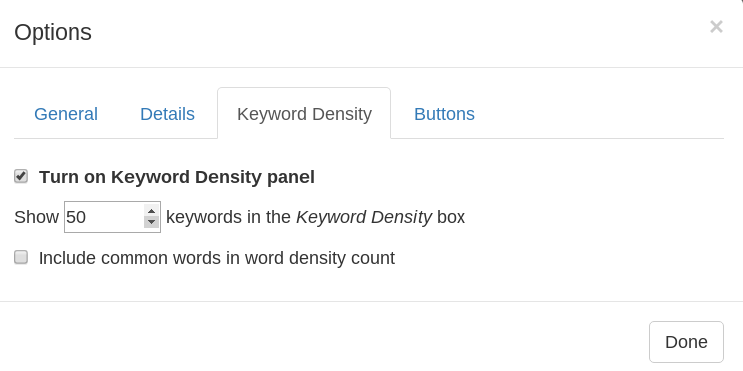
In the upper right of the screen, you will see two panels.
You are concerned with the second group, “Keyword Density.”
THESE ARE THE 50 MOST FREQUENTLY USED KEYWORDS IN ALL THE JOB DESCRIPTIONS YOU GATHERED!
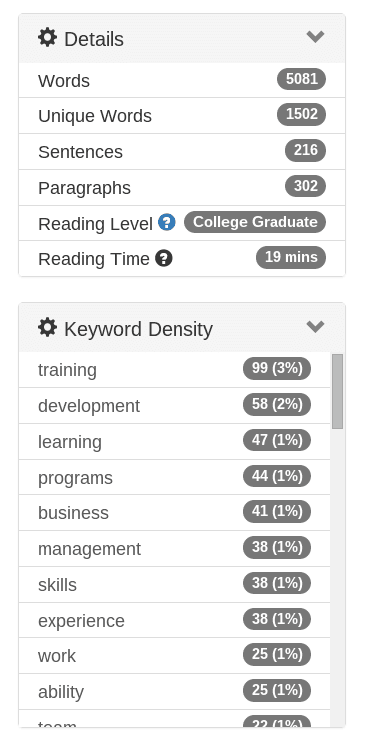
8. Print the results to a PDF or use the Save to Google Drive extension I explained earlier.
9. Copy and paste the keywords into the search terms document you developed earlier.
You now have 50 keywords that you should strategically use throughout your resume!
UPDATE: Another great tool I discovered is the Free Keyword Density Analyzer by SEO Book.
Just copy and paste your text into the “Plain text” box, unselect the options for “Include Meta tag Keywords” and “Include Meta tag Description.” Hit “Submit” to see the results.
Important Keyword Analysis Considerations
Do not keyword ‘stuff.’ Don’t get so caught up in repeating the same terms again and again. Use them naturally and strategically. Your resume should tell an original story. Be sure not to abuse the information you have to diminish that story.
The more content you can find to analyze, the more accurate your keyword analysis will be. Continue to revise this over time as you find more job descriptions. For specific job posting submissions, I would recommend using this tool and tweak your resume and cover letter accordingly.
B. Resume Keywords Phrase Analysis Tool
Keywords are fantastic, but now I am going to show you how to do one other analysis that will give you some powerful information.
1. Go to Online-Utility.
2. Copy and paste your job descriptions content into the empty box.
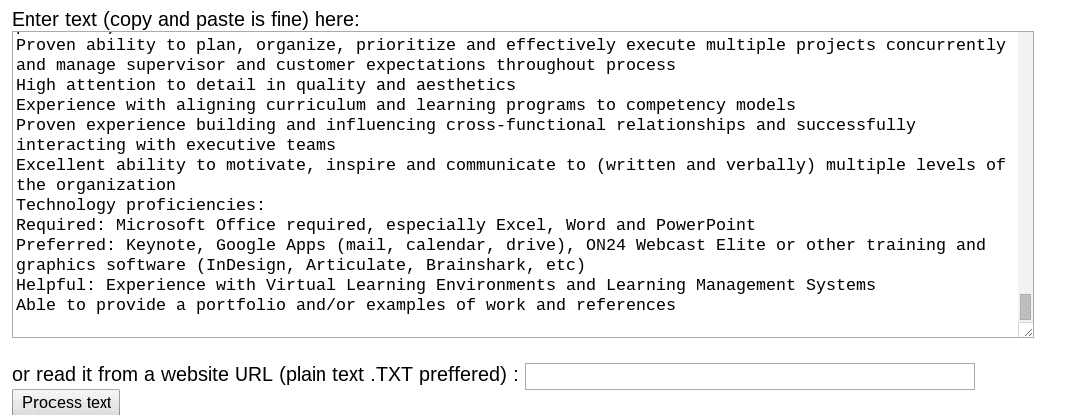
3. Select “Process text” below the box.
4. Copy and paste the following panels into your search terms document:
Some top phrases containing 8 words
Some top phrases containing 7 words
Some top phrases containing 6 words
Some top phrases containing 5 words
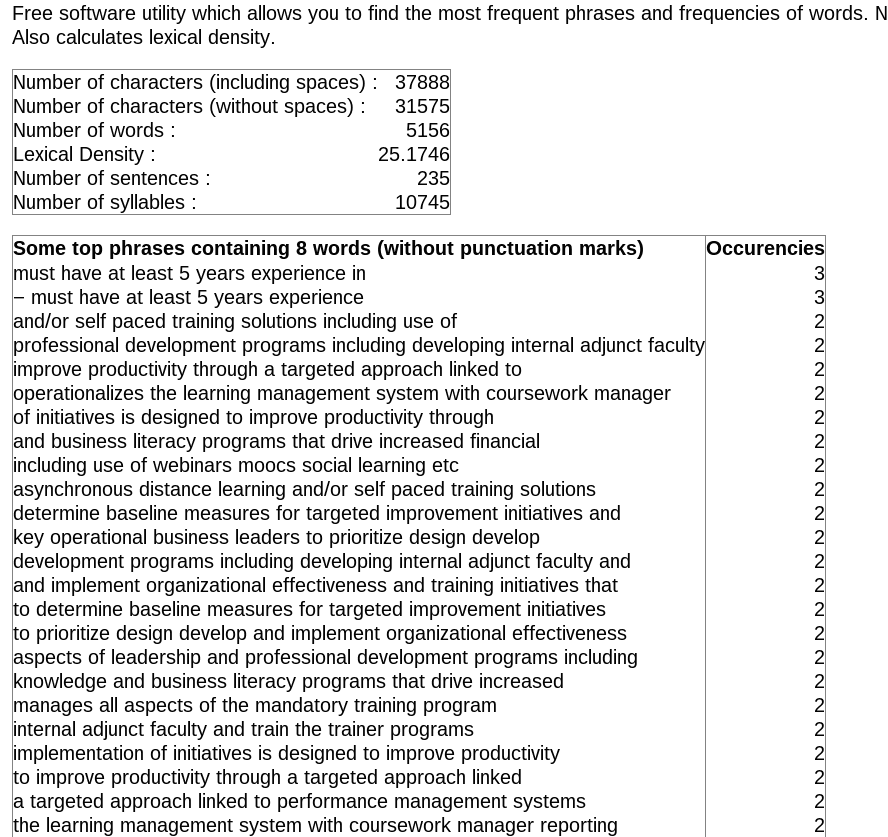
These are the most common phrases from the combined job descriptions content that also happen to hold many of your keywords.
The way I like to utilize these results is to decipher the key messaging that is within a block of content.
Why Does All These Resume Keywords and Power Verbs Stuff Matter?
In a word that is driven by data, important keywords and power verbs placed throughout your resume is vital and will – I promise – set you apart from the 98% who do not know what keyword analysis is, much less leverage it in their resume strategy.
Although I would not advise that you just copy and paste any parts of these results into your resume, what you should do is focus on the most frequent messages in your resume, coupled with your keywords, to mainly demonstrate solutions for their staffing needs.
Your Resume Represents You
What conversation do you want your resume to invoke with a potential employer?
Prospective Employer:
“Dammit, this sucks! We have all these business needs and need to find an incredibly talented and targeted person. Let’s put a job description out there that outlines our needs.”
Your Strategically Developed Resume:
“Hey, there. Yes, that does suck. Have a looksie at me, as I’m confident the brilliant (and damn good-looking) person I represent would be able to more than be a solution for the needs you describe here.”
Potential Employer:
“I think I’m in love. When can we meet with this person? Now?!”
Your Strategically Developed Resume:
“I’m sure we can arrange a meeting. We’ll have our people get back to your people ASAP.”
This is the conversation that you want your resume to have with a potential employer. It will communicate that you are the top choice solution for their business needs!
By leveraging the powerful information you now have with both resume keywords and power verbs, you are equipped to develop brilliant messaging to communicate why you are THE solution for their needs.
Now that you have your resume keywords, it’s time to leverage the power of listing references on a resume and get you prepared for the employment verification process.
Let our experts review or develop your resume. Explore our career services that are designed to make YOU shine.
Resume Development Guide Sections
How to Make the Perfect Resume
Part 1: How to Start a Resume
Part 3: Resume Verification and How to List References on Your Resume
Kris Fannin
Kris Fannin is a passionate change agent in workforce transformation. For more than 25 years, he's had the privilege of partnering with dozens of client organizations and leading hundreds of teams to become powerful influencers.
"Your legacy will be defined by the passion and impact of the people you influence. What do you want your legacy to be?"
